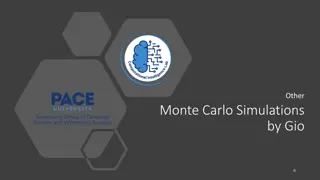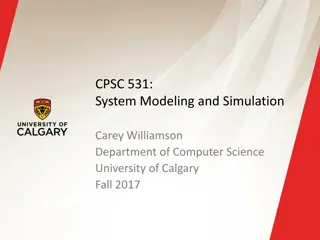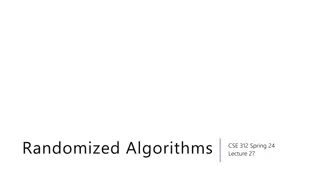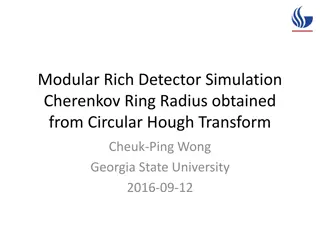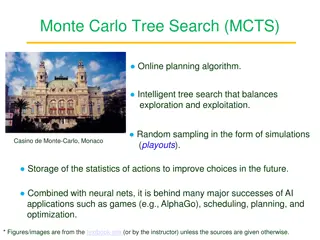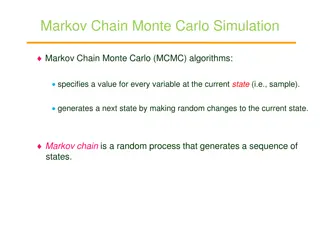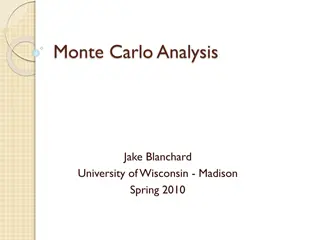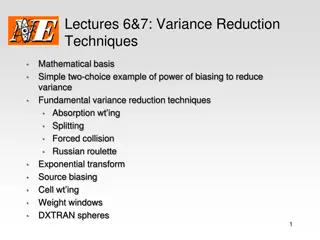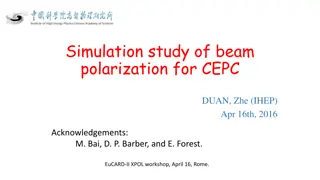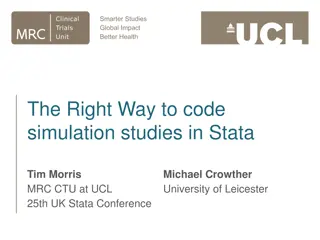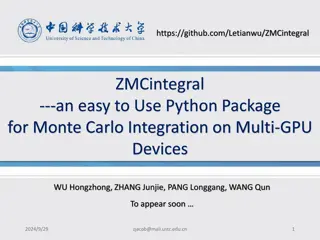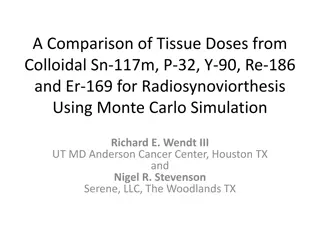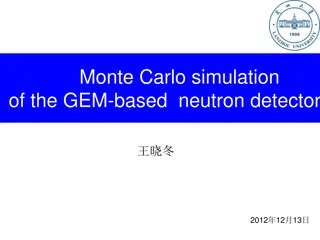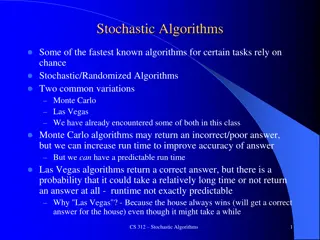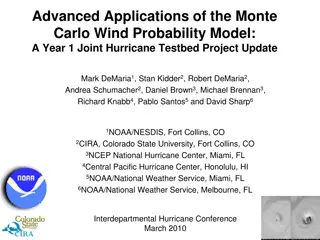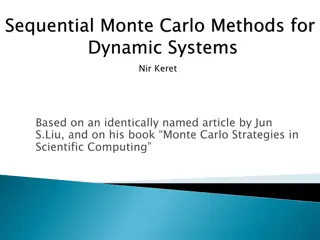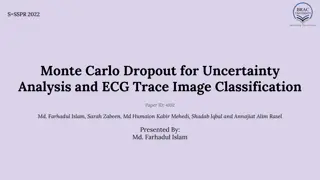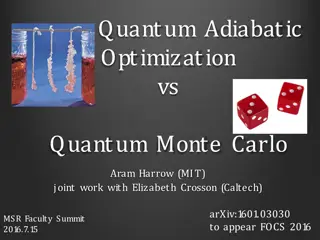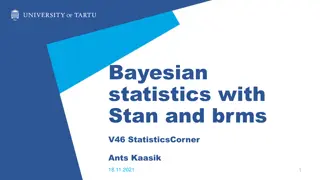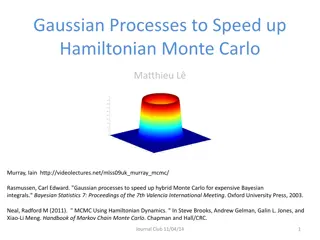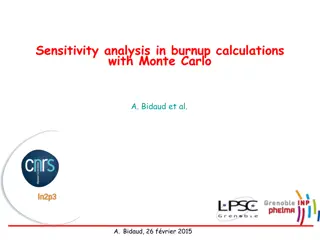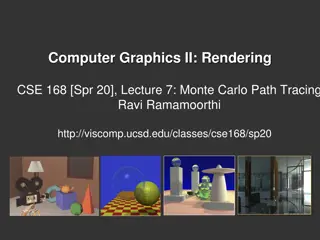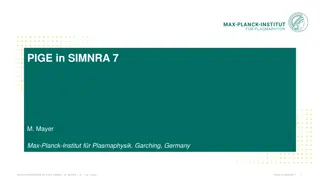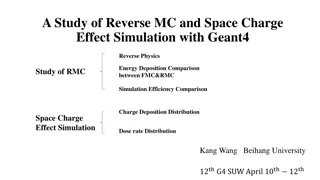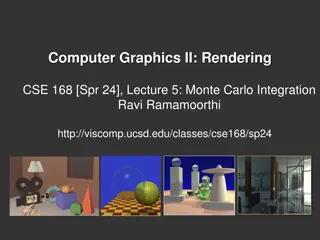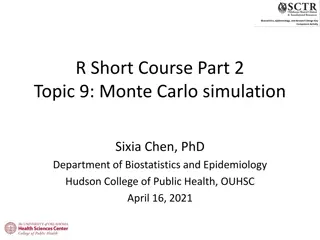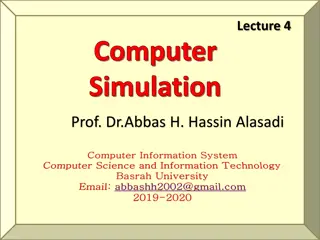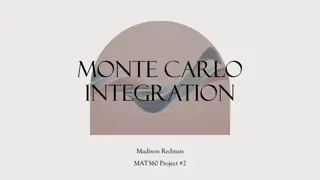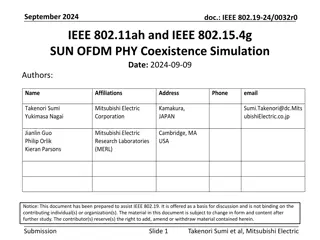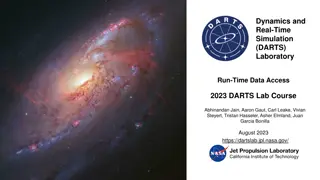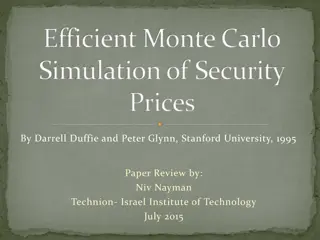Dark Matter Search with ATLAS: Active Learning Application
Explore an active learning application in the search for dark matter using ATLAS PanDA and iDDS. Investigate Beyond Standard Model physics parameters related to Hidden Abelian Higgs Model and New Scalar with a focus on cross-section limit calculations. Understand the process for generating Monte Car
0 views • 16 slides
System Modeling and Simulation Course Overview
This course covers the basics of systems modeling, discrete-event simulation, and computer systems performance evaluation. Topics include Monte Carlo simulation, probability models, simulation output analysis, queueing theory, and more. Professor Carey Williamson leads the course with a focus on pra
5 views • 21 slides
Monte Carlo Simulations and Probabilistic Techniques
Dive into the world of Monte Carlo simulations and probabilistic methods, understanding the basic principles, the Law of Large Numbers, Pseudo-Random Number Generators, and practical Monte Carlo steps. Explore topics like conditional probability, basic geometry, and calculus through engaging exercis
4 views • 10 slides
Monte Carlo Transport Simulation
Monte Carlo simulation is a stochastic technique that uses random numbers and probability statistics to investigate and solve problems. In the context of transport simulation, a Monte Carlo program simulates the passage of particles through matter, involving geometry, transport, visualization, detec
2 views • 11 slides
System Modeling and Simulation Overview
This content provides insights into CPSC 531: System Modeling and Simulation course, covering topics such as performance evaluation, simulation modeling, and terminology in system modeling. It emphasizes the importance of developing simulation programs, advantages of simulation, and key concepts lik
1 views • 28 slides
Randomized Algorithms: A Deep Dive into Las Vegas and Monte Carlo Algorithms
Randomized algorithms incorporate randomness into computations, with Las Vegas algorithms always providing the correct answer but varying in time, while Monte Carlo algorithms occasionally give wrong answers. Quick Sort is a classic Las Vegas algorithm that involves pivoting elements for sorting. Ch
4 views • 21 slides
Cherenkov Ring Radius Determination from Modular Rich Detector Simulation
Explore the process of obtaining the Cherenkov ring radius using Circular Hough Transform in a modular rich detector simulation. The study, conducted by Cheuk-Ping Wong from Georgia State University, delves into Monte Carlo results, ring finder algorithms, event displays, and radius distributions in
0 views • 20 slides
Monte Carlo Tree Search (MCTS) Algorithm in Online Planning
Monte Carlo Tree Search (MCTS) is an intelligent tree search algorithm that balances exploration and exploitation by using random sampling through simulations. It is widely used in AI applications such as games (e.g., AlphaGo), scheduling, planning, and optimization. This algorithm involves steps li
1 views • 16 slides
MCMC Algorithms and Gibbs Sampling in Markov Chain Monte Carlo Simulations
Markov Chain Monte Carlo (MCMC) algorithms play a crucial role in generating sequences of states for various applications. One popular MCMC method, Gibbs Sampling, is particularly useful for Bayesian networks, allowing the random sampling of variables based on probability distributions. This process
1 views • 7 slides
Monte Carlo Analysis for Uncertainty Assessment
Exploring the concept of Monte Carlo analysis as a method of uncertainty assessment through sampling inputs, running models, and analyzing outputs. Learn how to simulate dice rolls, evaluate probabilities, and assess accuracy with sample size. Monte Carlo approaches are versatile and applicable to v
1 views • 70 slides
Variance Reduction Techniques in Monte Carlo Programs
Understanding variance reduction techniques in Monte Carlo simulations is essential for improving program efficiency. Techniques like biasing, absorption weighting, splitting, and forced collision help reduce variance and enhance simulation accuracy. By adjusting particle weights and distributions,
1 views • 37 slides
Beam Polarization Simulation Study for CEPC
Simulation study on beam polarization for the Circular Electron Positron Collider (CEPC) using the PTC Poly- morphic Tracking Code. The study includes orbital and spin tracking, equilibrium polarization calculation, and Monte-Carlo simulation of depolarization rate. Comparison with other Monte-Carlo
2 views • 20 slides
The Right Way to Code Simulation Studies in Stata
Simulation studies in Stata involve using (pseudo) random numbers to generate data from a distribution for studying statistical methods. This process helps to evaluate different scenarios and understand the properties of statistical techniques. Key components like ADEMP (Aims, Data-generating mechan
5 views • 18 slides
ZMCintegral: Python Package for Monte Carlo Integration on Multi-GPU Devices
ZMCintegral is an easy-to-use Python package designed for Monte Carlo integration on multi-GPU devices. It offers features such as random sampling within a domain, adaptive importance sampling using methods like Vegas, and leveraging TensorFlow-GPU backend for efficient computation. The package prov
0 views • 7 slides
Comparison of Tissue Doses from Various Radionuclides for Radiosynoviorthesis
This study compares tissue doses from different radionuclides - Sn-117m, P-32, Y-90, Re-186, and Er-169 - for radiosynoviorthesis using Monte Carlo simulation. It explores electron range, half-life, and therapeutic absorbed doses to synovial tissues, presenting a hypothesis on the selection of radio
1 views • 12 slides
Monte Carlo Simulation of GEM-Based Neutron Detector and Detector Performance Analysis
A detailed exploration of Monte Carlo simulations for GEM-based neutron detectors, investigating their detection efficiency and performance characteristics. Various detector designs and concepts, including multi-layer converters and GEM detectors, are discussed, along with simulation results on sign
0 views • 12 slides
Stochastic Algorithms: Monte Carlo and Las Vegas Variations
Stochastic algorithms, including Monte Carlo and Las Vegas variations, leverage randomness to tackle complex tasks efficiently. While Monte Carlo algorithms prioritize speed with some margin of error, Las Vegas algorithms guarantee accuracy but with variable runtime. They play a vital role in primal
1 views • 13 slides
Advanced Applications of Monte Carlo Wind Probability Model in Hurricane Analysis
Update on the Year 1 Joint Hurricane Testbed Project, focusing on the Monte Carlo Wind Probability Model and its estimation of wind probabilities for different intensities. The model incorporates track and intensity error distributions, land proximity, and serial correlations to provide accurate for
0 views • 23 slides
Sequential Monte Carlo Methods for Dynamic Systems
This discusses Sequential Monte Carlo methods for estimating functions when direct sampling is difficult. It explains the basic idea, conditions on the distribution, handling known normalizing constants, weight diagnostics for importance distribution, and effective sample size considerations.
0 views • 37 slides
Monte Carlo Dropout for Uncertainty Analysis and ECG Trace Image Classification
In this paper, a Monte Carlo Dropout-based Convolutional Neural Network model is proposed for classifying ECG images to improve diagnosis accuracy and reduce uncertainty. The study aims to enhance the reliability of medical image analysis in the context of cardiovascular diseases through advanced de
0 views • 21 slides
Quantum Adiabatic Optimization vs. Quantum Monte Carlo
This content delves into the comparison between Quantum Adiabatic Optimization and Quantum Monte Carlo methods in quantum computing, discussing their approaches, algorithms, potential applications, and theoretical possibilities. It explores the concepts of adiabatic theorem, simulated annealing, sto
0 views • 19 slides
Bayesian Statistics with Stan and brms: A Feasible Approach to Inference
Bayesian inference and how it can be applied feasibly in research using Stan and brms. Explore the concept of giving prior distributions to model parameters and obtaining posterior distributions. Learn about Markov Chain Monte Carlo (MCMC) simulation and Hamiltonian Monte Carlo (HMC) for faster conv
0 views • 19 slides
Gaussian Processes to Speed up Hamiltonian Monte Carlo
Bayesian inference, Metropolis-Hastings, Hamiltonian Monte Carlo, and Markov Chain Monte Carlo are explored in the context of sampling techniques and estimation of probability distributions in complex models. The use of Gaussian processes to enhance the efficiency of Hamiltonian Monte Carlo is discu
0 views • 14 slides
Sensitivity Analysis in Burnup Calculations with Monte Carlo
The content discusses sensitivity analysis in burnup calculations using the Monte Carlo method, exploring uncertainty methods, comparison of adjoint and direct calculations, and sensitivities to initial conditions. It also covers topics such as the total Monte Carlo method, steady state calculations
0 views • 12 slides
Monte Carlo Path Tracing: Rendering Techniques & Applications
This content delves into Monte Carlo Path Tracing, a powerful method for rendering in computer graphics. Covering topics such as global illumination, sampling techniques, and advantages vs. disadvantages, this resource provides insights into integrating radiance for each pixel through random path sa
0 views • 47 slides
Monte Carlo Simulation of Bell Inequalities
In the fascinating world of quantum mechanics, Bell Inequalities challenge our understanding of reality and locality. Explore the historical context from EPR to CHSH, the concept of entangled Bell States, and the significance of Monte Carlo simulations in testing these theoretical frameworks. Discov
0 views • 15 slides
Overview of Sampling Methods in Markov Chain Monte Carlo
This content covers various sampling methods in Markov Chain Monte Carlo including Rejection Sampling, Importance Sampling, and MCMC Sampling. It delves into representing distributions, drawbacks of Importance Sampling, and the motivation behind Markov Chain Monte Carlo Sampling. The illustrations p
0 views • 25 slides
Real-Time Simulation Executive for DARTS Lab Course
The Dynamics and Real-Time Simulation (DARTS) Laboratory is developing an exemplar simulation executive for their 2023 course. The simulation aims to create a dynamic vehicle assembly, set up data logging, run simulations in real-time, and render related models. The project outlines requirements, go
0 views • 42 slides
Intercomparison of PIGE Codes and Simulation of IBA Spectra
Discover the intercomparison of PIGE codes and the simulation of IBA spectra, including Monte-Carlo simulation details, analytical codes comparison, RBS/NRA/ERDA processes, and input data considerations. Explore the complexities and efficiencies in simulating ion beam analysis techniques.
0 views • 12 slides
Simulation Study of Reverse MC with Geant4 for Energy Deposition Comparison
Explore a study on Reverse Monte Carlo (MC) and space charge effect simulation using Geant4 for energy deposition comparison. The research includes efficiency comparisons, charge deposition distributions, and dose rate distributions conducted by Kang Wang from Beihang University, focusing on the val
0 views • 14 slides
Monte Carlo Integration in Computer Graphics: Overview and Applications
Explore Monte Carlo Integration in computer graphics, from motivation to algorithms, advantages, and disadvantages. Learn about its application in rendering complex shading effects and how it provides robust solutions for irregular domains and high-dimensional integrals. Understand the basics of pro
0 views • 51 slides
Generating MC Production Data Sets for WHIZARD Simulation
Learn about the process of generating Monte Carlo (MC) production data sets using WHIZARD simulation. Steps involve running Guinea-Pig, submitting integration and event generation jobs, and organizing production groups. Explore the detailed procedures for creating necessary files and directories in
1 views • 12 slides
Monte Carlo Simulation: Distributions, Setups, and Sampling Methods
Explore Monte Carlo simulation with simulations from various distributions, setup options, and sampling techniques. Learn how to generate Monte Carlo samples and evaluate estimation criteria for point estimation. Dive into population parameters, statistical models, and more in this comprehensive gui
0 views • 18 slides
Understanding Simulation Techniques in System Analysis
Explore the nuances of discrete-event, continuous, and Monte Carlo simulations in system analysis. Learn how each type of simulation is applied, the characteristics of systems they model, and their relevance in various fields.
2 views • 10 slides
Exploring Monte Carlo Integration Methods for Advanced Applications
Uncover the fascinating history and applications of Monte Carlo integration, from its origins in nuclear physics to its diverse uses in computational science, statistics, and engineering. Dive into the specifics of crude Monte Carlo integration, advanced convergence techniques, interesting discoveri
0 views • 10 slides
Understanding Monte Carlo Integration: Techniques and Applications
Explore the history and techniques of Monte Carlo integration, including its applications in various disciplines such as computational science, statistics, and engineering. Learn about the specific methods, interesting discoveries, and the code involved in Monte Carlo integration.
0 views • 10 slides
IEEE 802.19-24 Simulation Update for Coexistence of IEEE 802.15.4g and IEEE 802.11ah
Explore the simulation update for the coexistence of IEEE 802.15.4g and IEEE 802.11ah in the September 2024 document. The study focuses on smart utility use cases, presenting simulation parameters, performance metrics, and the background of the study. Dive into the details of simulation models, depl
0 views • 14 slides
Understanding DARTS Lab: Simulation Objects, Data Access, and DVar Layer
Explore the Dynamics and Real-Time Simulation (DARTS) Laboratory's run-time data access, simulation objects, DVar documentation, and the importance of the DVar layer in providing standardized access to rich data for simulation objects. Discover the significance of this layer in decoupling services f
0 views • 21 slides
Efficient Monte Carlo Simulation of Security Prices Explained
Delve into the world of Brownian Motion, Wiener Process, Stochastic Calculus, and Security Price Models as outlined in the 1995 paper by Darrell Duffie and Peter Glynn from Stanford University. Understand the background, motivation, assumptions, and theorems behind efficient Monte Carlo simulation t
0 views • 41 slides
Monte Carlo Simulations in Computational Physics
Explore the history and application of Monte Carlo simulations in computational physics, a powerful numerical technique for solving complex physical systems. Learn about statistical mechanics, Ising models, Heisenberg models, and more. Discover how Monte Carlo simulations have revolutionized the fie
0 views • 27 slides


